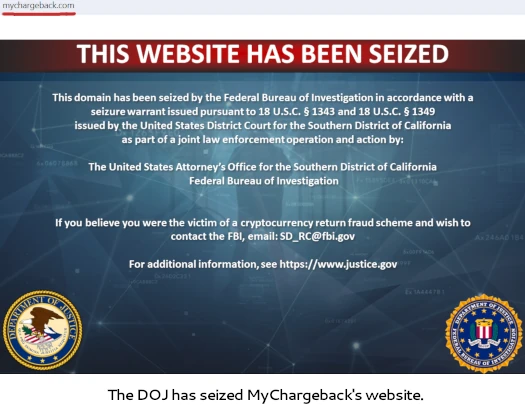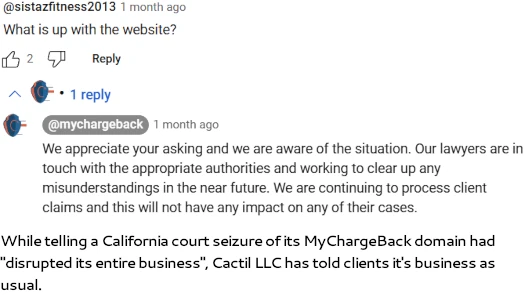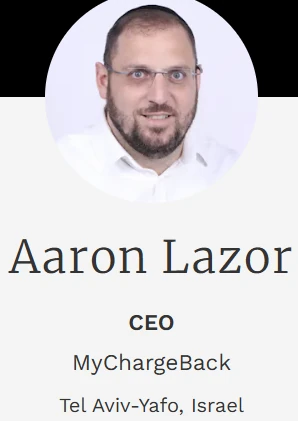DOJ response to MyChargeBack petition suggest indictments
 The DOJ’s response to MyChargeBack’s “give us back our website domain” petition suggests indictments are coming.
The DOJ’s response to MyChargeBack’s “give us back our website domain” petition suggests indictments are coming.
Following seizure of its website domain in late June, MyChargeBack’s parent company Cactil LLC filed a petition in California.

Cactil LLC’s petition sought recovery of the MyChargeBack domain and information on the seizure warrant.
The petition was unfortunately filed under seal, so we’ve had to wait for the DOJ response filing for further information.
The DOJ filed its response on August 15th, revealing its investigation is ongoing and indictments are likely.
Cactil’s request to unseal the seizure warrant application should be denied because there is no right of access to warrant materials during the pre-indictment stage of an ongoing criminal investigation.
Other points of interest in the DOJ’s response filing are:
- the DOJ has “established probable cause to believe that the website has been involved in violations of federal law”;
- the website seizure followed a “magistrate judge’s neutral and independent finding of probable cause”;
- the DOJ alleging return of MyChargeBack’s website would result in it being used to “commit additional criminal acts”; and
- Cactil LLC alleging its victims are being poached by “competitor” Cybertrace
Most of the DOJ’s response filing pertains to legal argument responses to Cactil LLC’s claims. One claim from Cactil LLC, that seizure of the MyChargeBack domain has “has disrupted Cactil’s entire business” is a bit odd.
In response to the question “What is up with the website?”, posted on Cactil LLC’s latest YouTube video last month, Cactil stated they are “continuing to process client claims and this will not have any impact on any of their cases”.

 Cactil LLC and its associated associated companies are run by Aaron Lazor, who is based out of Tel Aviv, Israel.
Cactil LLC and its associated associated companies are run by Aaron Lazor, who is based out of Tel Aviv, Israel.
The DOJ claims Cactil LLC runs several “cryptocurrency return fraud scheme[s]”, one of which was MyChargeBack.
These outfits are better known as recovery scams, many of which target victims of MLM Ponzi schemes.
The model sees victims of fraud pitched on promises of recovery. These promises come with an attached fee.
Following payment of the fee, nothing substantial towards recovery takes place. It’s at this point the victim realized they’ve been scammed again.
Specifics of Cactil LLC’s alleged recovery scam won’t be known till the DOJ makes its criminal case public.
Update 25th August 2025 – Cactil LLC has secured a MyChargeBack non-prosecution agreement from the DOJ.

